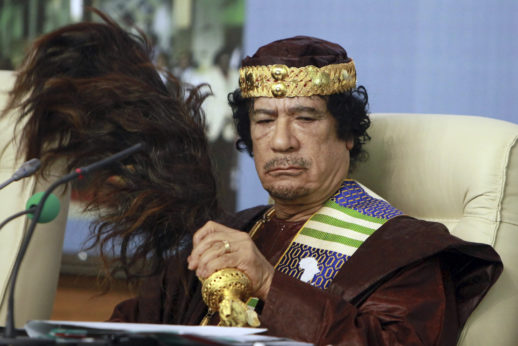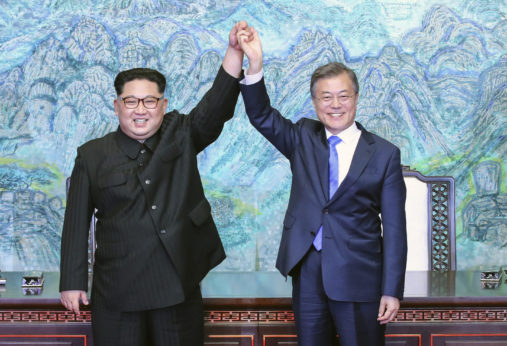
Cancelling the upcoming summit between himself and North Korean leader Kim Jong Un wasn’t enough for Trump; he also had to dangle the option of nuclear annihilation this morning. In his letter officially nixing the meeting, Trump, in his typical boastful style, reminded Kim of how “massive and powerful” U.S. nuclear capabilities were and “pray[ed] to God they will never have to be used.”
With less than a month to go before the two leaders were scheduled to meet in Singapore, the president has announced the summit is a no-go, citing North Korean “hostility” as justification. Even just a cursory review of events of the past few weeks, however, shows quite clearly that if anyone sabotaged this summit, it was the Trump administration.
The “Libya model”
The administration attempted to lay blame for the sinking of the summit on North Korea, with “sources” telling the media it was the North’s criticism of Vice President Mike Pence that supposedly pushed Trump’s hand. The North Korean government had earlier today called recent remarks made by Pence “ignorant and stupid” and implied U.S. officials were poisoning the atmosphere ahead of the Trump-Kim meeting.

And what were the remarks in question? In an interview on Fox News Monday, Pence warned that if Kim Jong Un doesn’t cooperate, he could end up like Libyan leader Muammar Gadhafi, who was overthrown and killed by U.S.-backed rebels in 2011.
Pence’s Gadhafi comments were in line with a campaign carried out by other administration officials—particularly National Security Advisor John Bolton—the last several days which has pushed for what they call a Libya-style solution to the nuclear weapons issue on the Korean peninsula.
In late 2003, the Gadhafi government completed negotiations with the U.S. to unilaterally dismantle its nuclear, chemical, and biological weapons programs in exchange for a guarantee of Libya’s security and sovereignty. Within years, however, Gadhafi was removed from power by rebel forces assisted by NATO. The Libyan leader ended up being executed, shot in the head out in the desert.
With Bolton and Pence holding out the “Libya model” as an option for dealing with North Korea’s nuclear weapons program, is it really any wonder that the Kim government would question the U.S.’ seriousness about achieving anything with this summit?
Peddling a Gadhafi solution to the nuclear issue is not the only provocative action taken by the Trump administration in the run-up to the June meeting, though. Ignoring the opportunity to make a gesture of goodwill, the U.S. continued with plans to hold war games in conjunction with South Korea—an annual exercise that simulates an invasion of the North.
“Art of the deal” or art of the distraction?
Some media commentators—especially those on the right—are speculating that Trump’s cancellation of the meeting is a shrewd negotiating tactic, part of a grand plan to squeeze a “better deal” out of Kim. Given Trump’s inflated sense of his own wheeling-and-dealing skills, it is perhaps possible he sees this as part of a genius strategy.
Just as likely, however, is the possibility that the timing of the cancellation announcement is part of an effort to divert attention from the classified briefings that are happening on Capitol Hill today concerning developments in the Trump corruption and collusion investigation.
Lawmakers in both houses of Congress and from both parties are meeting with intelligence officials today to receive secret documents relating to surveillance of the Trump campaign during the 2016 election. Trump, with no evidence, has been railing for days about what he calls “Spygate,” implying that the FBI illegally infiltrated his presidential campaign to spy on him and his associates.
A hearing was scheduled to share documents with only Trump-friendly GOP lawmakers initially, but after protests by Democrats, a second meeting was put on the agenda for today that will include some opposition legislators. In addition to the FBI and National Intelligence Directors, White House chief of staff John Kelly and Deputy Attorney General Rod Rosenstein (who is overseeing Special Counsel Robert Mueller’s investigation) will also be present.
The briefing was originally requested by Trump ally and House Intelligence Committee Chairman Rep. Devin Nunes, who first made claims about FBI surveillance. As long as it was only going to be Republicans in attendance, the White House was eager to publicize the supposed exposure of an FBI conspiracy against Trump. It was a chance to lend legitimacy to the president’s “Spygate” fantasy.
Late Wednesday evening, the Justice Department caved and scheduled a meeting for Democrats. Now, there was a possibility that opposition voices would have information to possibly undermine the Nunes-Trump narrative about an anti-Trump conspiracy. By Thursday morning, all the Trump administration wanted to talk about was North Korea.
Détente deferred
For now, it seems any further détente on the Korean peninsula will be deferred. The major steps toward permanent peace that have been made recently are on hold, scuttled by the whims of an unpredictable leader and his belligerent regime (and I don’t mean the one in Pyongyang).
In late April, North and South Korean leaders held a historic meeting at the Demilitarized Zone in Panmunjom, where they pledged to cease all hostile acts against one another and move toward officially ending the Korean War. Immediately after the cancellation, South Korean President Moon Jae-in’s office said it was “embarrassed” by the U.S.’ decision. “Denuclearization of the Korean peninsula and enduring peace are historic tasks that cannot be abandoned or delayed,” it tweeted. How Trump’s announcement will affect relations between North and South is unknown.

Earlier this month, North Korea sent a signal to Washington that it was serious about negotiating when it released three U.S. citizens who were imprisoned in the North. They were sent home with Secretary of State Mike Pompeo who had come to iron out details for the Singapore meeting.
And right now—at the very moment that Trump is cancelling the summit—international journalists are in North Korea, having just visited the site of the country’s nuclear tests and verified that it has been decommissioned. Surprisingly, North Korea did all of this despite the “Libya model” frenzy of Pence, Bolton, and others.
Now we are left with the empty rhetoric of a U.S. president who claims “a great opportunity for lasting peace and great prosperity” has been lost. But Trump does leave an opening to flip-flop again…perhaps when he needs another quick distraction from some unwelcome developments in the Mueller investigation. He says to Kim, “call me…if you change your mind.” Wait, wasn’t it Trump who just changed his mind?
So a Trump-Kim summit might yet materialize; Trump is still eager for that Nobel Peace Prize, after all. In the meantime, as Trump reminded everyone in a press conference this morning, the U.S. will continue to build up its military machine to a level “it’s never been at before,” with the injection of hundreds of billions of dollars in new spending.










